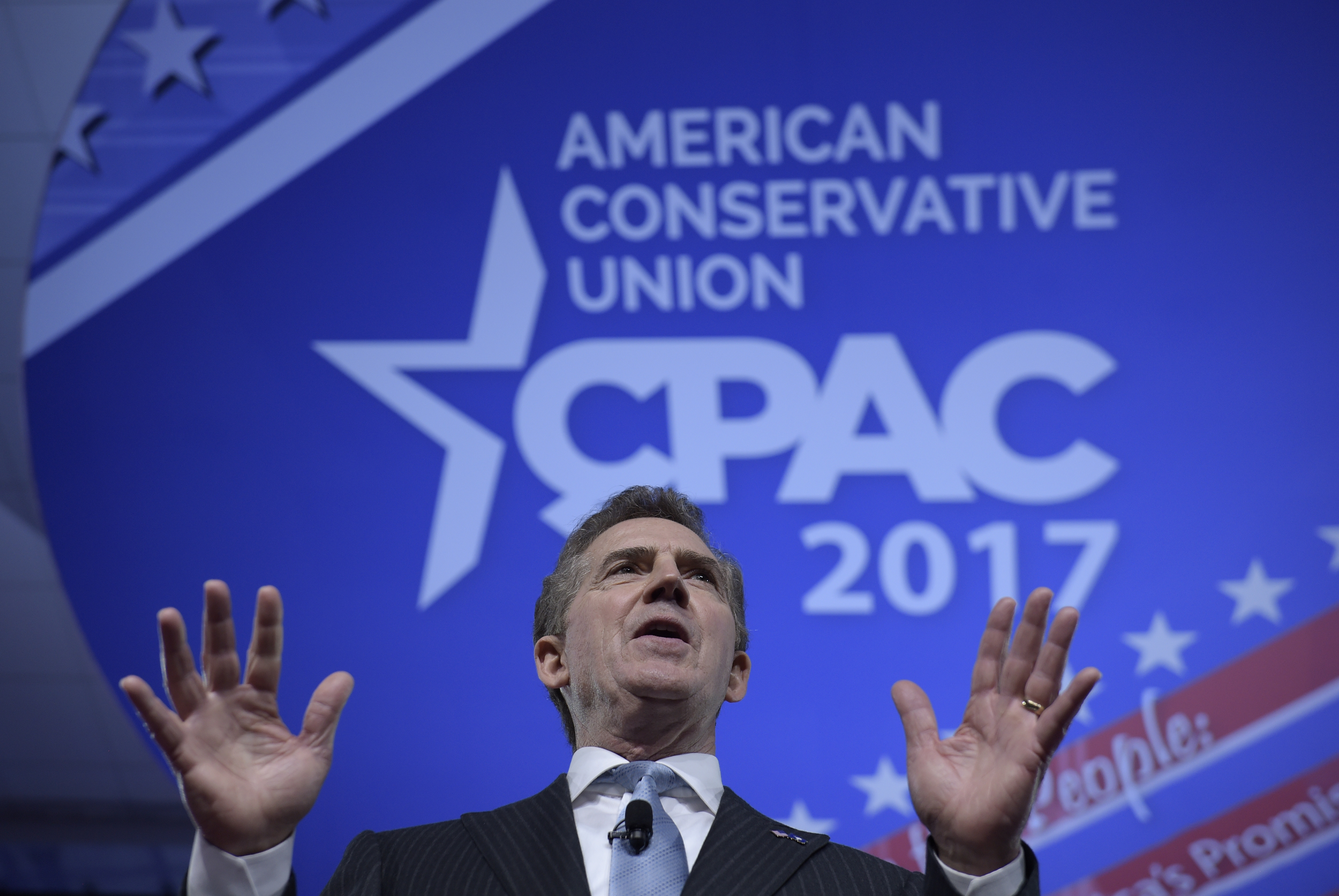What Jim DeMint's ouster says about the conservative movement's identity crisis
It's as if the conservative movement went straight from adolescence to senility


A free daily email with the biggest news stories of the day – and the best features from TheWeek.com
You are now subscribed
Your newsletter sign-up was successful
What do you get when you're on the winning team in Washington? In the case of Jim DeMint, president of the Heritage Foundation until just yesterday, you get fired.
You might chalk this up to internal politics. After all, DeMint lost a power struggle inside the heavyweight conservative think tank. But he's also a casualty — not the first, and certainly not the last — of the conservative movement's drifting sense of purpose and identity.
That drift didn't begin with Donald Trump. Yes, our 45th president has defied Republican orthodoxy on everything from free trade to Russia policy. But he could only do that, and bring other Republicans around to his way of thinking so quickly, because conservatives had already lost faith in their old institutions, leaders, and formulas. As soon as Trump offered right-leaning voters and activists an alternative, they were ready for it. Conservative groups have been playing catch-up ever since.
The Week
Escape your echo chamber. Get the facts behind the news, plus analysis from multiple perspectives.

Sign up for The Week's Free Newsletters
From our morning news briefing to a weekly Good News Newsletter, get the best of The Week delivered directly to your inbox.
From our morning news briefing to a weekly Good News Newsletter, get the best of The Week delivered directly to your inbox.
The Heritage Foundation was ahead of the rest, though. It was the biggest institutional player in Trump's transition effort. DeMint, a former Tea Partying Republican senator from South Carolina, was never publicly dismissive of Trump, unlike the leaders of many other conservative institutions — including Heritage's own lobbying offshoot, Heritage Action. Mike Needham, the Heritage Action CEO who seems to have been the driving force behind DeMint's removal, in 2015 called Trump "a clown" who "needs to be out of the race" for the GOP nomination. DeMint, by contrast, was notably ecumenical: He and the staff he brought to Heritage had Tea Party credibility — in the Senate he had been one of the movement's early stalwarts — but also a degree of open-mindedness about how conservatism was changing after the devastation of the Bush years. DeMint had an affinity for the libertarian-leaning Rand Paul as well as more hawkish figures like Marco Rubio.
What was most important in keeping the hawks and the doves, the protectionists and the free traders, and all the other factions and fractions of conservatism together over the last eight years was, of course, another ex-senator: Barack Obama. Having an enemy in the White House saved conservatives from a lot of soul-searching after George W. Bush, just as having Bill Clinton in office a decade earlier had helped conservatives avoid a crackup after the first President Bush. The conservative movement's culpability for the Iraq War and failure to foresee the Great Recession after years of Republican economic stewardship, were tough questions that could be deferred so long as the focus was on defeating Obama and his one major legislative achievement, ObamaCare.
But what would conservatism mean once Obama was gone? What was the program? This wasn't just a philosophical problem, it was an organizational one. DeMint's critics accused him of politicizing Heritage, but that gets the story backwards. He was hired away from the Senate in the first place, in late 2012, because Heritage was already moving in a more political direction. That direction was clear from the creation of Heritage Action in 2010 by Needham and Ed Fuelner — DeMint's predecessor as Heritage's president and now his successor as the think tank's interim leader. Politics replaced policy during the Obama years because nobody knew what conservative policy meant any more beyond the most basic commitments to lower taxes and fewer regulations.
Consider ObamaCare itself. Not only did the Democratic president's health-care legislation bear a remarkable resemblance to the health-care reform that Mitt Romney had signed into law as the Republican governor of Massachusetts, but one of the key features of both ObamaCare and RomneyCare, the individual mandate, had originally been championed by Stuart Butler, a top policy expert at, yes, the Heritage Foundation. There had always been libertarians and some conservatives who objected to the individual mandate. But it only became a defining issue for conservatives once it was identified with a Democratic president. When Butler advanced the idea in the early 1990s as an alternative to the proposals of Hillary Clinton's health-care task force, it was marketed as a conservative policy and bore the Heritage imprimatur.
A free daily email with the biggest news stories of the day – and the best features from TheWeek.com
Research at Heritage has always had a partisan dimension. The think tank did criticize George W. Bush when he pushed for a prescription drug add-on to Medicare. It fired a foreign-policy scholar, however, when he dared to come out against the Republican president's wars. Feulner's proudest achievement, and the thing about which Heritage boasts the most, is the role its Mandate for Leadership played in influencing the Reagan administration's agenda. It's meant to justify the think tank's existence — to show that policy ideas have consequences. But the Reagan era ended nearly three decades ago. Heritage continues to publish Mandate for Leadership updates, yet how much responsibility does it want to claim for George W. Bush's agenda? Or for whatever Donald Trump's will be in a few years' time?
That's a question DeMint's successor won't be able to answer, because the truth is that neither Heritage nor the wider conservative movement is ever going to recapture its youth. The Reagan years were full of hope because conservative ideas were fresh — they hadn't been tried by Jimmy Carter or Lyndon Johnson, but they also hadn't really been tried by Richard Nixon or Gerald Ford. Reagan was a beginning, and Heritage helped write the first chapter in conservatism's policy book. But like many aspiring authors, the conservative movement's leaders lost the plot after the first few pages. Since the 1980s, conservative groups have been adept at raising funds for themselves. They have not been adept at advancing conservatism beyond Reagan. It's as if the conservative movement went straight from adolescence to senility.
DeMint inherited a mission impossible. He was supposed to lead a serious think tank, but also an influential Republican auxiliary, and perhaps above all a fundraising operation. Those elements were supposed to cohere in the name of conservatism. But the conservatism of institutions like Heritage has become such an exercise in nostalgia that even Republican primary voters have begun to demand something different. DeMint, in his own way, may have been open to exploring new paths — those shown by some of the more interesting and unusual Republicans of recent years. But nobody can define a post-Reagan, post-Bush conservatism with an institution whose mind froze over in the '80s and whose wallet requires political hype.
Daniel McCarthy is director of the Novak Journalism Fellowship Program at the Fund for American Studies, the editor of Modern Age, and a columnist at The Spectator. His freelance journalism has appeared in a variety of publications in the U.S. and internationally, including the New York Times, the Daily Telegraph, The National Interest, and Reason.
